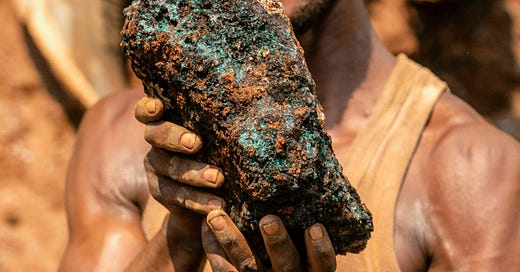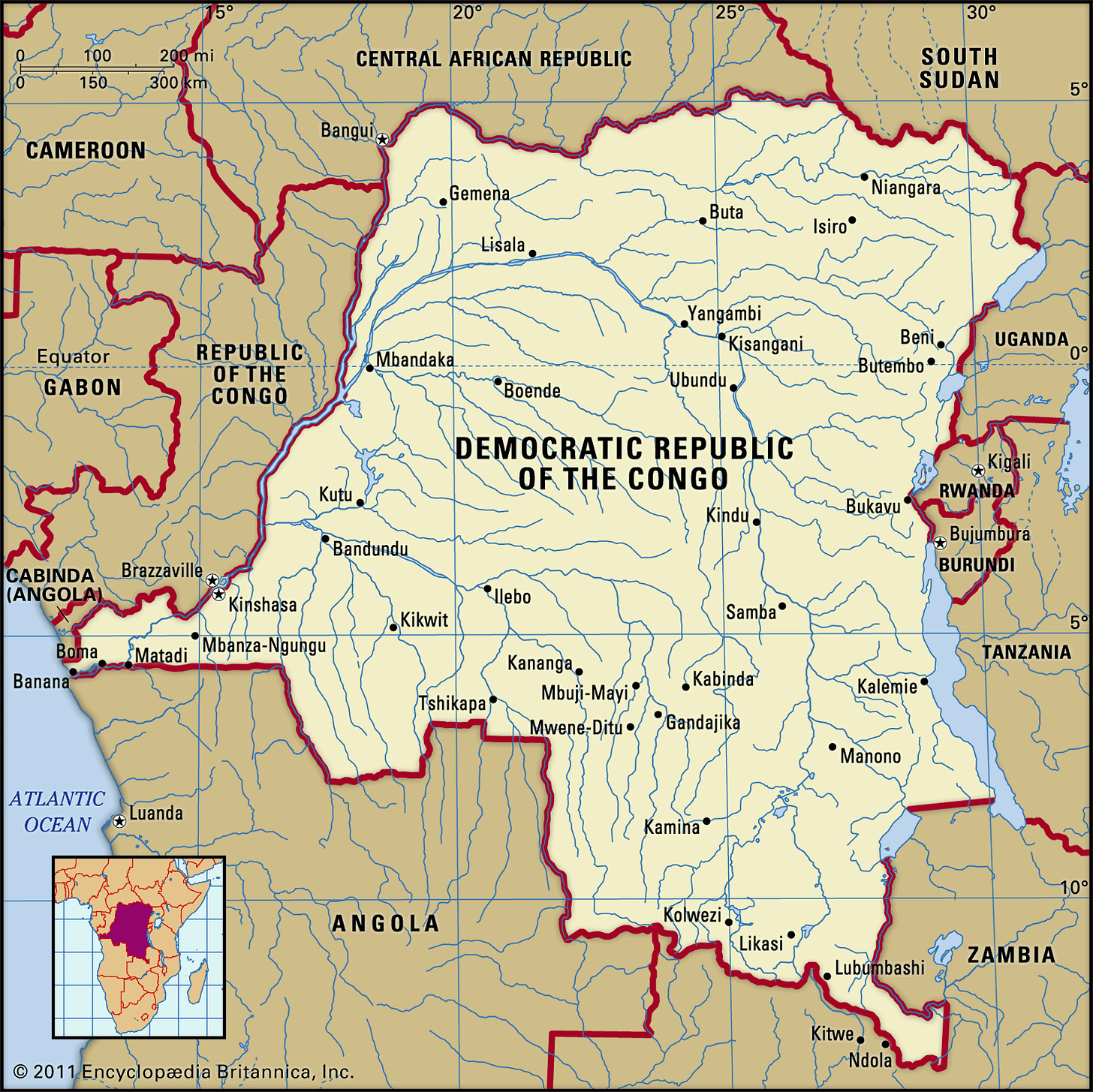Free Congo! And Another Reason to Stop Vaping
Exploitative cobalt mining through history and into today
The Democratic Republic of Congo (DRC, Congo or the Congo) has historically been rich in natural resources. In the 19th century, when Congo was known as the Congo Free State, the Congolese people faced genocide upon King Leopold II of Belgium's control over the land. He threatened death if they did not harvest rubber for him, leaving 10 million dead. Mass killings and rapes, burnt-down villages, starvation, and many other atrocities left thousands traumatized. During World War II, the Uranium mined from the Congolese mines was critical in America's ability to create the world's first atomic bombs. After the DRC gained independence from Belgium in 1960, abundant materials like Copper, Cobalt, Gold, Diamonds, Tin, Coltan, Magnesium, Lead, and Zinc, as well as plentiful energy sources like oil, coal, and Uranium became the center of the conflicts they would face moving forward.
The motive was no different for the Tutsi, an ethnic group with members in Rwanda (a neighboring state on the Congo's Eastern border). In Rwanda, the Tutsi slowly infiltrated the area, melding with the native community, the Hutu. They developed a feudal relationship that functioned effectively until Belgian control in 1919 showed favoritism for the Tutsi. The Tutsi gained and remained in power over the indigenous Hutu until 1961, when the Hutu overthrew them. The Rwandan Hutu used their power in 1994 to conduct a genocide against the Tutsi, killing hundreds of thousands of Tutsis. Despite facing genocide, the Tutsi overthrew the Hutu, creating the Rwandan Patriotic Front (RPF)- a political party that has remained in power since 1996. After the Rwandan genocide, Congo faced two wars, spanning from 1996 to 2003. The first war broke out in the wake of the genocide, with Hutu extremists killing both Tutsis and moderate Hutus, causing one million deaths. The further weakening of the relationship between the DRC and Rwanda was the cause of the second war, killing over three million people.
The Congo has faced civil unrest through destabilization and destruction at the hands of Rwandan Tutsi for the past 30 years. Throughout 1998 and 1999, networks developed between traders and military officials that would aid them in selling these minerals outside the DRC, promising them a share of the profits. On March 23rd, 2009, Joseph Kabila, President of the DRC, signed a peace agreement with the Rwandan Tutsi that would end their ongoing insurgency. However, this only led to the emergence of M23 (whose name derives from the date of the peace agreement), inheriting the same motives as the Tutsis and beginning their new rebellion in 2012. Although M23 did invade substantial Eastern territory, they were pushed out by the Congolese army and the UN. M23 is not state-affiliated; however, the UN has proposed "solid evidence" that the Rwandan government supports them (both logistically and through their military) despite their vocal opposition to the claims.
Most recently, M23 reemerged in 2022, leading to further fear, destabilization, and general insecurity in Congo. In response to their emergence, the Democratic Forces for the Liberation of Rwanda (FLDR) emerged, defending Congo from M23. Ethnic Hutus dominate the FLDR, as many fled to Congo after the execution of the Rwandan genocide. This new wave of civil unrest caused the eruption of dozens of armed groups driven by their desire to get a cut of the land's precious minerals. The profit motive remained despite the high civilian death tolls.
After a UN plan failed to stabilize the region for 20 years, the Congolese population resented the UN and the West. The Congolese people want stability and security in the region, but the West has proven unhelpful. Rwanda's friendliness with the West is another point of contention between them and Congo. The uncertainty in the region has created dire circumstances for everyone in the Congo. With dozens of active militant groups functioning in the DRC, acts of sexual violence, child soldiers, and more have been reported. As time goes on, the conditions continue to worsen. Since the beginning of 2023, over 7 million people have been displaced. The camps that refugees often flee to are unsanitary, leading to the rampant spread of cholera, Ebola, measles, and monkeypox. These displacements are triggered by armed conflict, like the commonly occurring threats and attacks on civilians from M23 and similar armed groups. While women have been facing catastrophic levels of sexual violence and children have no access to education, poverty is hitting record highs. 23.4 million people are facing food insecurity, and 2.8 million children are acutely malnourished. It is estimated that upwards of 40,000 children work in unregulated Cobalt mines in the Katanga province alone (pictured below), making less than $2 per day. From 1996 through today, 6 million people have been killed by armed conflicts from various militant groups invading towns, taking over land, and conquering the area by any means necessary. On top of these factors, Congo also faces large-scale natural disasters like floods and volcanic eruptions, displacing and killing even more civilians.
Gaining control over land with such abundant minerals is a shared goal of all players in this conflict. This is a common theme in history; any colonizing force is responsible for perpetrating it to varying degrees. Being in America, it is vital to recognize our role in conflicts, even if they may seem distant. Given that America has grown to be an international superpower, we will play a role, more often than not. Technology is constantly evolving and an industry that requires many resources. Cellphones, computers, electric toothbrushes, smart watches, electric cars, and vapes all contain lithium-ion batteries. It is in almost every single portable consumer electronic device. Cobalt is an essential component of lithium-ion batteries. Congo contains more Cobalt reserves than the rest of the world combined. Siddharth Kara, a fellow at Harvard's T.H. Chan School of Public Health and author of Cobalt Red, described the work areas of freelance miners: "You have to imagine walking around some of these mining areas and dialing back our clock centuries. People are working in subhuman, grinding, degrading conditions. They use pickaxes, shovels, stretches of rebar to hack and scrounge at the earth in trenches and pits and tunnels to gather Cobalt and feed it up the formal supply chain". These "freelance" miners are just ordinary people. They collect and sell what they mine, receiving only about $3 for a day's work. Additionally, Cobalt is toxic to touch and breathe. Kara depicted scenes he witnessed of poor Congolese people touching and breathing it all day, some with babies strapped to their backs. Further, children are heavily exploited in the Cobalt mining industry as they are frequently kidnapped by militant groups and forced into slavery, with the militant groups collecting all their earnings.
Government corruption is the reason that this abuse persists. In 1960, Patrice Lumumba was elected. Part of his campaign was to promise that the sale of minerals in the region would benefit the Congolese people. During his first six months in office, he was assassinated, chopped up, dissolved in a tub of acid, and replaced with a dictator who restored the country to its previous corrupt system. Lumumba is a prime example of what it means to challenge the sinister profit incentive as an unstable country rich in resources. There is much fear about what change means for leaders there. With the power imbalance and corruption already at play, anyone who did want to step up the challenge would likely have a similar fate as Lumumba. That is unless the Global North protects the Congo.
Technology is a necessity in our daily lives. How can we use technology ethically if it is created at the expense of Congolese people? Unfortunately, it is not entirely possible; however, the best way to do this is to buy technology sparingly, wait as long as possible to purchase new tech, recycle all of your technology so the materials can be reused, and buy refurbished items. Some companies understand this moral dilemma and have worked to create a better way to buy technology. For example, all Apple products can be turned in, refurbished, or recycled. Apple has additionally promised to use only recycled Cobalt by 2025. Being conscious of the companies you buy from is a big deal, especially regarding technology. One of the best ways to boycott the unethical mining of Cobalt is to stop vaping. Every single vape device contains Cobalt. If quitting is not in the cards for you, reducing your consumption or using devices with refillable pods is exponentially better than buying disposable vapes. Giving less money to companies that benefit from the slavery of Congolese people not only lessens the demand for those items but also is a significant first step in forcing complicit countries to be accountable. America has ignored the Congo despite us buying so much of their minerals. For there to be a Congo that is free from slavery, where children are fed and educated, and where workers are protected and earn a living wage, the Global North needs to take accountability for their complacency and exploitation of the Congolese people.
In 1964, Malcolm X drew connections between the Congolese struggle and racism in America, displaying our interconnectedness. He stated: "As long as we think – that we should get Mississippi straightened out before we worry about the Congo, you will never get Mississippi straightened out – not until you start realizing your connection with the Congo." We have touched on collective liberation in previous posts, and I mention it again to highlight its importance in yet another example. We must boycott, and we must protest, and we must keep talking about Congo. As long as there are suffering people anywhere, none of us are free from the shackles of oppression, exploitation, and imperialism that we see in the Congo. A free Congo is only feasible if we, in the Global North, fight for them too.








